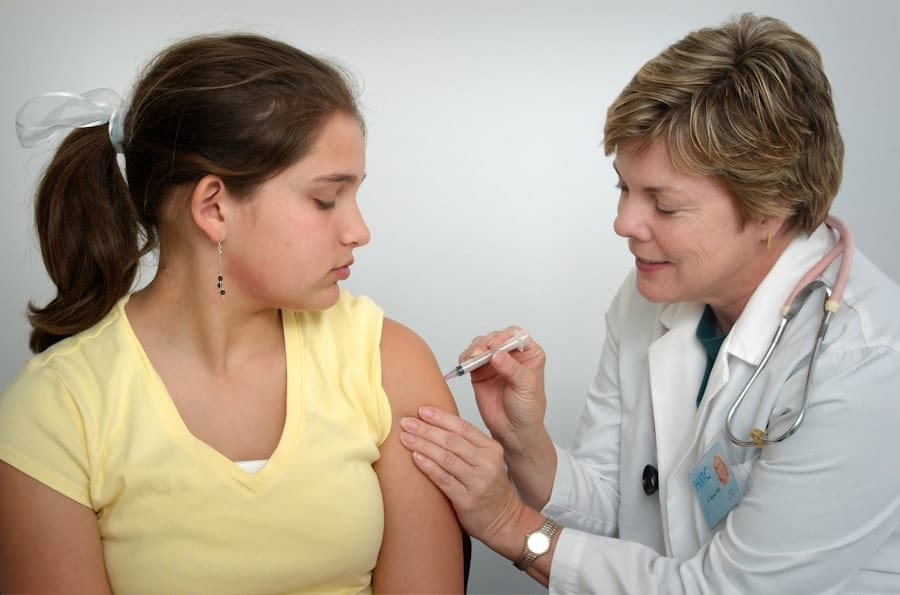In recent years, the field of immunology has witnessed a paradigm shift towards personalized medicine, particularly in the development of vaccines tailored to individual patients. Personalized vaccines represent a significant advancement in the fight against infectious diseases and cancer, as they take into account the unique genetic makeup and immune responses of each individual. This approach not only enhances the efficacy of vaccines but also minimizes potential side effects, making it a crucial area of research in modern medicine.
The traditional one-size-fits-all vaccine strategy often fails to account for the diverse genetic backgrounds and immune profiles of different populations, leading to variable responses and effectiveness. Personalized vaccines aim to bridge this gap by leveraging advanced technologies such as genomics, proteomics, and bioinformatics. The importance of personalized vaccines extends beyond mere efficacy; it encompasses the broader goal of improving public health outcomes.
By tailoring vaccines to the specific needs of individuals, healthcare providers can enhance the overall immune response, leading to better protection against diseases. For instance, in cancer immunotherapy, personalized vaccines can stimulate the immune system to recognize and attack tumor cells more effectively. This targeted approach not only increases the likelihood of successful treatment but also reduces the risk of adverse reactions that can occur with conventional therapies.
As we continue to explore the potential of personalized vaccines, it becomes increasingly clear that they hold the key to revolutionizing how we prevent and treat diseases.
Key Takeaways
- Personalized vaccines tailor immune responses to individual genetic and health profiles for improved effectiveness.
- Understanding the immune system is crucial to designing vaccines that target specific pathogens or cancer cells.
- Personalized vaccines work by identifying unique markers and training the immune system to recognize and attack them.
- These vaccines offer potential benefits such as enhanced protection, reduced side effects, and treatment of complex diseases.
- Ongoing research addresses challenges like cost, accessibility, and ensuring broad applicability in diverse populations.
Understanding the Immune System
To appreciate the significance of personalized vaccines, it is essential to have a foundational understanding of the immune system and its intricate workings. The immune system is a complex network of cells, tissues, and organs that work together to defend the body against pathogens such as bacteria, viruses, and parasites. It comprises two main components: the innate immune system, which provides immediate but non-specific defense, and the adaptive immune system, which develops a targeted response to specific pathogens over time.
The adaptive immune system is further divided into humoral immunity, mediated by B cells that produce antibodies, and cell-mediated immunity, involving T cells that directly attack infected or malignant cells. The immune response is initiated when pathogens invade the body, triggering a cascade of events that lead to the activation of various immune cells. Antigen-presenting cells (APCs) play a crucial role in this process by capturing and processing antigens from pathogens and presenting them to T cells.
This interaction is vital for the activation of T cells, which then proliferate and differentiate into effector cells capable of eliminating the threat. The memory component of the adaptive immune system ensures that upon re-exposure to the same pathogen, the body can mount a rapid and robust response. Understanding these mechanisms is fundamental to developing personalized vaccines that can effectively harness and enhance these natural processes.
How Personalized Vaccines Work

Personalized vaccines are designed to leverage an individual’s unique immune profile to create a tailored immunization strategy. The process typically begins with a thorough analysis of a patient’s genetic information, including their human leukocyte antigen (HLA) type, which plays a critical role in determining how their immune system recognizes and responds to antigens. By identifying specific mutations or unique antigens present in a patient’s tumor or pathogen, researchers can develop vaccines that specifically target these elements, thereby enhancing the likelihood of an effective immune response.
One prominent example of personalized vaccine technology is the use of neoantigens—novel antigens that arise from tumor-specific mutations. These neoantigens are unique to each patient’s cancer and can be identified through genomic sequencing of tumor samples. Once identified, these antigens can be synthesized and incorporated into a vaccine formulation designed to stimulate a robust T cell response against the tumor.
This approach not only targets cancer cells more effectively but also minimizes damage to healthy tissues, which is a common drawback of traditional cancer therapies such as chemotherapy and radiation. By focusing on the unique characteristics of an individual’s disease, personalized vaccines represent a cutting-edge strategy in immunotherapy.
The Potential Benefits of Personalized Vaccines
The potential benefits of personalized vaccines are vast and multifaceted, extending beyond improved efficacy in disease prevention and treatment. One significant advantage is the ability to tailor vaccine formulations based on an individual’s specific immune response profile. This customization can lead to enhanced immunogenicity—the ability of a vaccine to provoke an immune response—resulting in stronger protection against diseases.
For example, studies have shown that personalized cancer vaccines can elicit more potent T cell responses compared to conventional vaccines, leading to better clinical outcomes for patients. Moreover, personalized vaccines can significantly reduce adverse effects associated with traditional vaccination methods. By targeting specific antigens relevant to an individual’s condition, these vaccines minimize the risk of overstimulating the immune system or causing unintended reactions.
This is particularly important in vulnerable populations, such as those with compromised immune systems or pre-existing health conditions.
Challenges and Considerations
Despite their promising potential, the development and implementation of personalized vaccines face several challenges that must be addressed before they can become mainstream in clinical practice. One major hurdle is the complexity and cost associated with creating individualized vaccines. The process often requires advanced technologies such as next-generation sequencing and bioinformatics tools to analyze genetic data and identify suitable antigens.
This complexity can lead to increased production costs and longer timelines for vaccine development, which may limit accessibility for patients.
Regulatory agencies must establish clear guidelines for evaluating the safety and efficacy of personalized vaccines, which may differ significantly from traditional vaccine approval processes.
Ensuring that these vaccines meet rigorous standards while also being adaptable to individual patient needs presents a unique challenge for regulators. Furthermore, ethical considerations surrounding genetic data privacy and informed consent must be carefully navigated as personalized vaccines become more prevalent.
Current Research and Development

Current research in personalized vaccines is rapidly advancing across various fields, including oncology, infectious diseases, and autoimmune disorders. In oncology, numerous clinical trials are underway to evaluate the efficacy of personalized cancer vaccines targeting neoantigens derived from individual tumors. For instance, companies like Moderna and BioNTech have been at the forefront of developing mRNA-based personalized cancer vaccines that have shown promising results in early-phase clinical trials.
These innovative approaches harness the power of mRNA technology to instruct cells to produce specific antigens that stimulate an immune response against cancer cells. In addition to cancer research, efforts are being made to develop personalized vaccines for infectious diseases such as HIV and influenza. Researchers are exploring ways to identify unique viral epitopes that can be targeted by personalized vaccines, potentially leading to more effective immunizations against these challenging pathogens.
Collaborative initiatives between academic institutions, biotechnology companies, and government agencies are essential for accelerating research efforts and translating findings into clinical applications.
The Future of Personalized Vaccines
The future of personalized vaccines holds immense promise as advancements in genomics, proteomics, and artificial intelligence continue to evolve. As our understanding of the immune system deepens and technologies become more sophisticated, we can expect a new era of vaccine development that prioritizes individual patient needs. The integration of machine learning algorithms into vaccine design could enable researchers to predict optimal antigen combinations based on vast datasets of immune responses, further enhancing vaccine efficacy.
Moreover, as public awareness grows regarding personalized medicine, there may be increased demand for tailored healthcare solutions that prioritize individual health profiles. This shift could drive investment in research and development for personalized vaccines across various therapeutic areas. Additionally, collaborations between academia and industry will be crucial for overcoming existing challenges related to cost and accessibility, ensuring that these innovative solutions reach diverse populations worldwide.
The Role of Personalized Vaccines in Immune System Support
Personalized vaccines represent a transformative approach in modern medicine that aligns with the growing trend towards individualized healthcare solutions. By harnessing the unique characteristics of each patient’s immune system and disease profile, these vaccines have the potential to revolutionize disease prevention and treatment strategies across various medical fields. As research continues to advance and challenges are addressed, personalized vaccines will play an increasingly vital role in supporting immune system function and improving health outcomes for individuals worldwide.
The journey towards fully realizing their potential is ongoing; however, it is clear that personalized vaccines are poised to become a cornerstone of future medical practice.
In the quest to enhance immune system support through personalized vaccines, it’s essential to consider the broader implications of technology in healthcare. A related article that delves into innovative tools for research is the Rankatom Review: The Game-Changing Keyword Research Tool, which discusses how advanced keyword research can aid in uncovering valuable insights in the medical field, including vaccine development and personalized medicine strategies.
FAQs
What are personalized vaccines?
Personalized vaccines are immunizations tailored to an individual’s unique genetic makeup or specific health conditions. They aim to enhance the immune response by targeting antigens most relevant to the person’s immune system.
How do personalized vaccines support the immune system?
Personalized vaccines stimulate the immune system by presenting specific antigens that trigger a targeted immune response. This approach can improve the effectiveness of the vaccine by focusing on the individual’s unique immune profile.
What diseases can personalized vaccines target?
Personalized vaccines are being researched for various diseases, including certain cancers, infectious diseases, and autoimmune disorders. They are designed to address conditions where a one-size-fits-all vaccine may not be as effective.
How are personalized vaccines developed?
Development involves analyzing a person’s genetic information and immune system characteristics to identify suitable antigens. These antigens are then used to create a vaccine that is customized to elicit a strong immune response.
Are personalized vaccines currently available to the public?
While some personalized vaccine approaches, especially in cancer treatment, are in clinical use or trials, widespread availability is limited. Research is ongoing to expand their application and accessibility.
What are the benefits of personalized vaccines compared to traditional vaccines?
Personalized vaccines can provide a more precise immune response, potentially leading to better protection and fewer side effects. They may also be effective in cases where traditional vaccines are less successful.
Are there any risks associated with personalized vaccines?
As with any medical treatment, personalized vaccines may carry risks such as allergic reactions or unintended immune responses. However, their tailored nature aims to minimize adverse effects by considering individual factors.
How long does it take to create a personalized vaccine?
The timeline varies depending on the disease and technology used but generally takes longer than traditional vaccines due to the need for individual analysis and customization.
Can personalized vaccines be used for preventive care?
Yes, personalized vaccines have the potential to be used preventively, especially in individuals at high risk for certain diseases, by enhancing their immune defense before exposure.
What is the future outlook for personalized vaccines?
Advancements in genomics and immunology are expected to expand the development and use of personalized vaccines, making them more accessible and effective for a broader range of diseases.

